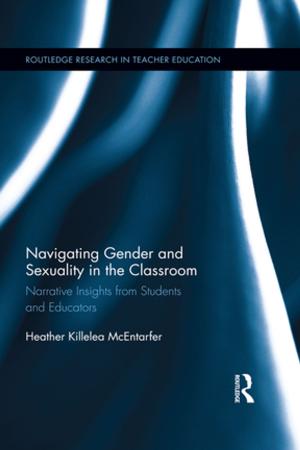Inside Stories
Qualitative Research Reflections
Nonfiction, Reference & Language, Education & Teaching| Author: | ISBN: | 9781136505829 | |
| Publisher: | Taylor and Francis | Publication: | December 6, 2012 |
| Imprint: | Routledge | Language: | English |
| Author: | |
| ISBN: | 9781136505829 |
| Publisher: | Taylor and Francis |
| Publication: | December 6, 2012 |
| Imprint: | Routledge |
| Language: | English |
Although articles reporting research studies are helpful in acquainting students with methodological approaches, they often make the process look so straightforward, clean, and effortless. It is rare to find an article that tells the "real" story behind the finished product. By having real researchers tell their own stories of "mucking around" with methodological and ethical issues in qualitative research, we get a more realistic, human story of the process. This is a collection of such stories. Authors were asked to describe their own experiences with methodological and ethical struggles as they engaged in their work.
Each of the essays offers insight into the research approach used as well as particular issues which became apparent during the research process. Key issues raised by the authors include early learnings; gaining entry; overlapping, conflicting roles, and the boundaries of these roles; differential power relationships; who tells the story and whose story is told; ethical concerns related to confidentiality; and the influence of a researcher's particular philosophy or theoretical framework on his or her research. Throughout the book we see scholars whose personal stories or autobiographies intersect closely with their research projects.
deMarrais introduces a unique framework to help students gain an overview of qualitative research methods and the underpinnings and processes in these approaches. This framework is centered on the ways we understand phenomena using qualitative research approaches that engage archival knowledge, narrative knowledge, or observational knowledge.
Although articles reporting research studies are helpful in acquainting students with methodological approaches, they often make the process look so straightforward, clean, and effortless. It is rare to find an article that tells the "real" story behind the finished product. By having real researchers tell their own stories of "mucking around" with methodological and ethical issues in qualitative research, we get a more realistic, human story of the process. This is a collection of such stories. Authors were asked to describe their own experiences with methodological and ethical struggles as they engaged in their work.
Each of the essays offers insight into the research approach used as well as particular issues which became apparent during the research process. Key issues raised by the authors include early learnings; gaining entry; overlapping, conflicting roles, and the boundaries of these roles; differential power relationships; who tells the story and whose story is told; ethical concerns related to confidentiality; and the influence of a researcher's particular philosophy or theoretical framework on his or her research. Throughout the book we see scholars whose personal stories or autobiographies intersect closely with their research projects.
deMarrais introduces a unique framework to help students gain an overview of qualitative research methods and the underpinnings and processes in these approaches. This framework is centered on the ways we understand phenomena using qualitative research approaches that engage archival knowledge, narrative knowledge, or observational knowledge.















